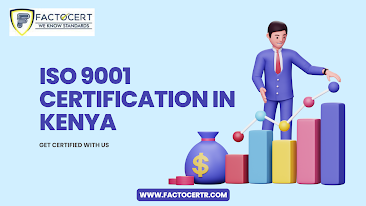Why is GMP certification important for companies operating in Kenya?
Introduction:
GMP Certification in Kenya (Good Manufacturing Practices) is a critical aspect of quality assurance and compliance for businesses operating in various sectors, including pharmaceuticals, food processing, cosmetics, and medical devices. GMP certification in Kenya ensures that a company's manufacturing processes meet established quality standards and adhere to regulatory requirements. In Kenya, obtaining GMP certification is essential for companies that want to remain competitive, meet customer expectations, and expand their operations domestically and internationally.
Why GMP Certification in Kenya is essential for Kenyan business?
Here are the top five reasons why GMP certification is essential for companies operating in Kenya:
Ensures Product Quality and Safety:
GMP certification in Kenya ensures that companies produce high-quality products that meet customer requirements and expectations. By complying with GMP standards, companies can produce safe and effective drugs, food, and other products that minimize the risk of adverse reactions and ensure customer safety.Enhances Reputation and Brand Image:
GMP certification in Kenya is a mark of quality and compliance, indicating that a company has met established industry standards and regulatory requirements. Obtaining GMP certification demonstrates a company's commitment to quality and customer satisfaction, enhancing its reputation and brand image.Facilitates Regulatory Compliance:
GMP Certification in Kenya helps companies to comply with regulatory requirements established by government agencies such as the Kenya Bureau of Standards (KEBS), the Pharmacy and Poisons Board (PPB), and the National Environmental Management Authority (NEMA). By complying with these regulations, companies can avoid penalties and legal sanctions, and operate legally.Improves Operational Efficiency:
GMP certification in Kenya helps companies to streamline their production processes, reduce waste, and improve resource utilization. By implementing GMP standards, companies can identify and mitigate risks, such as product contamination, equipment failure, and supply chain disruptions, which can lead to downtime, product recalls, and reputational damage. By reducing these risks, companies can improve their operational efficiency and reduce costs, ultimately improving their bottom line.Facilitates International Trade and Market Access:
GMP Certification in Kenya is a globally recognized standard for quality and compliance, and obtaining GMP certification can help companies to access international markets and trade agreements. In the pharmaceutical sector, for instance, GMP certification is a requirement for companies seeking to export their products to the European Union, the United States, and other international markets. In the food processing sector, GMP Certification in Kenya helps companies to meet the requirements of international buyers and access new markets. By obtaining GMP certification, companies can expand their operations and increase their revenue streams, ultimately contributing to the growth of the Kenyan economy.
Who is the best GMP Consultant in Kenya?
GMP consultants are experts in helping companies develop and implement quality management systems that meet the GMP standards and regulatory requirements. Factocert is a leading ISO and GMP consultant that provides comprehensive consulting and training services to companies operating in various sectors, including pharmaceuticals, food processing, and medical devices. Factocert's team of experienced consultants helps companies navigate the complex GMP certification process, from risk assessment and documentation to implementation and verification. By engaging Factocert as their GMP consultant, companies can ensure compliance with GMP standards, improve operational efficiency, and enhance their reputation and brand image.
Contact the best GMP Consultant at contact@factocert.com or at www.Factocert.com so that their consulting professionals can give you an effective project plan if you are having problems putting this GMP Certification management system into practice or are unsure how to achieve GMP Certification in Kenya.
Conclusion:
GMP Certification in Kenya is essential for companies operating in Kenya, as it ensures product quality and safety, enhances reputation and brand image, facilitates regulatory compliance, improves operational efficiency, and facilitates international trade and market access. Companies seeking to obtain GMP certification should engage reputable certification bodies and implement effective quality management systems that meet GMP standards. By obtaining GMP Certification in Kenya, companies can gain a competitive edge in the Kenyan market and access new opportunities domestically and internationally.
.png)


Comments
Post a Comment